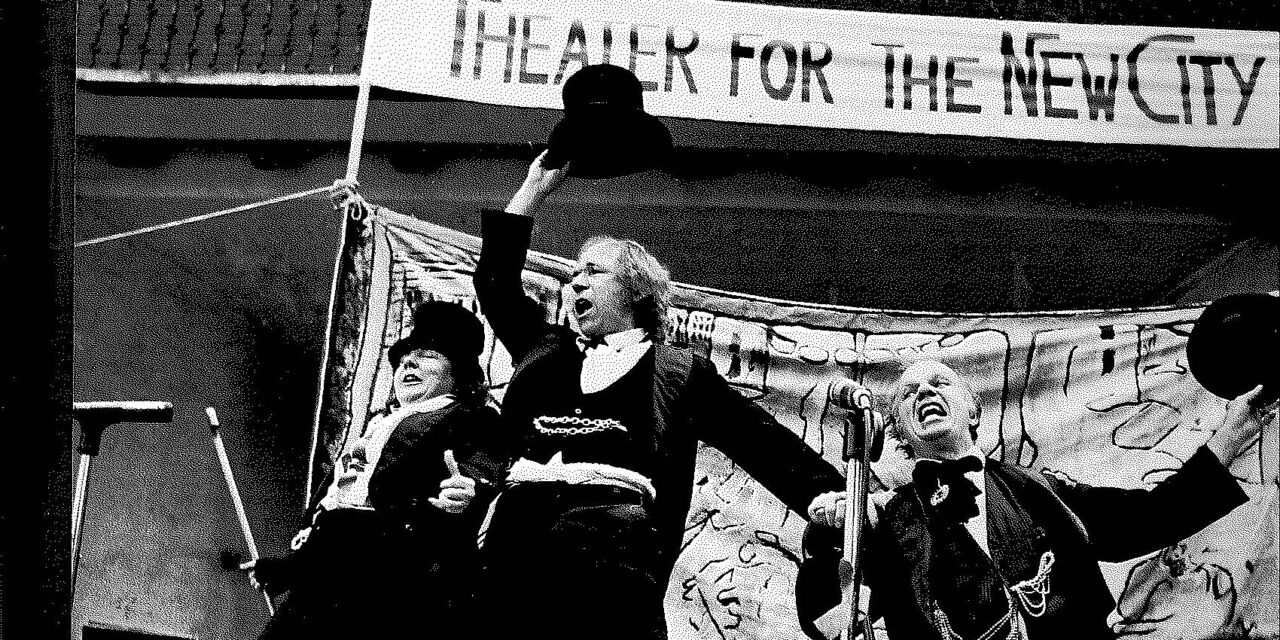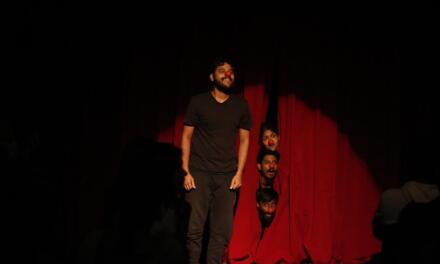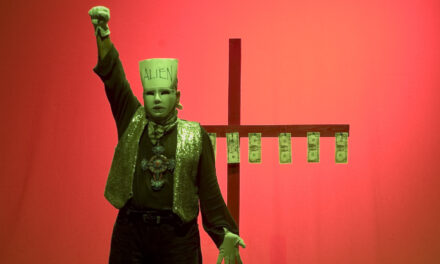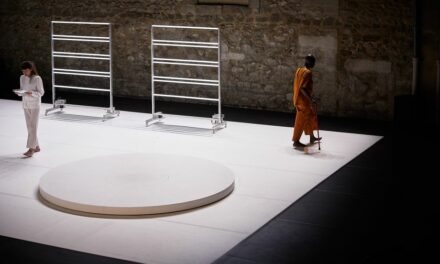Marcina Zaccaria, Editor of the Theatre and Opera Section of The Theatre Times, got the opportunity to speak with Crystal Field, Founder and Artistic Director of Theater for the New City. Crystal Field founded TNC as an exciting cultural hub in the 70s for artists determined to break the 4th wall.
On February 24, 2020, Theatre for the New City hosted this year’s Love ‘N Courage Benefit, honoring Hair’s James Rado.
Marcina Zaccaria: Can you tell me about your early days at Judson Church in 1971?
Crystal Field: Judson Church was where I cut my teeth for theater, so to speak. This was before Theater for the New City … I was in the first company of Lincoln Center. So while I was in the company of Lincoln Center, I got introduced to Judson Church, and Judson was really in the middle of the avant-garde.
MZ: Did your success with this cause you to found Theater for the New City? It’s 48 years ago, right? Do 48 years feel like a long time?
CF: That’s what caused us to found Theater for the New City … We decided that we would use Dracula Sabbat and we would do a longer run than at Judson, and that would be our first piece that we would do. What had happened was that offered a year-and-a-half rent-free at the Westbeth between Bank and Bethune. It was a couple stories. It was a real building. It was a whole building, under the condition that we would make a theater there. So the between the first piece we did was Dracula Sabbat. And, that’s how I fell into running a theatre. Because before then, I was an actress, but it’s a long story, if I was going to tell you the story about Westbeth, what happened was we were given a year-and-a-half rent-free. What happened at that time was run by a committee of artists. It was an Artist’s Colony. We heard – John Claude Van Itallie heard that we were going to get our first grant – and it was going to be from the NEA and it was going to be $12,000.
MZ: What drove you to create these “Town Festivals”. I don’t know if you could call the Greenwich Village Halloween Parade that, but why?
CF: My philosophy is that we have to do art of the highest quality, but that art is a civic necessity, and we do not believe in the high prices for tickets. The theatre has to be affordable, and it should be free wherever possible, and we believe very strongly in the neighborhood in which our theater lives.
MZ: You have to stay so focused as an artist. In these new days, people are talking about immersive theatre, it’s all about immersive. In those days, there were plays that kept the fourth wall and plays that absolutely broke down the fourth wall. Do you think that that is accurate?
CF: We were part of that movement. To break the fourth wall, and put dance and song into straight plays. We were part of that. And the whole Halloween thing was part of saying, you have Christmas, you have Hanukkah, but there’s one holiday that everyone can enjoy and be part of … Everything we do is an excuse for art. So if we say, we are looking for murals for Halloween. We have 19 artists – 19 different artists. If you do a mural, it will stay up for a whole year until next year’s Halloween, when it will get painted out, and a new one will come in, so that means we’ve got many beautiful samples of artwork. Some of the stuff that’s down there could be in the museum. It would do very well…
We are very connected to anything that will improve the neighborhood, that’s going to make life better for the thing in the City and that make them tend to artwork, and be involved with artists and art. That is is part of our mission, because of what I said to you. Art is not a luxury.
MZ: It could be a safe outlet for people.
CF: It is also a means of expression. Life cannot exist without art. That is something that is hard to get into people’s heads because they say “I have to eat. I have to pay for rent. I have to be warm in the winter and cooler in the summer, if possible.” They don’t realize that if you took their art away if their art got taken away, they would die. They only know it, when it gets taken away. It has been taken away in the schools a lot. Teachers and parents have put in their own money into projects so that they can still have money for art when the government stops funding it. That’s what people realize.
MZ: So given this, that people need art. I believe in this. I agree with you. I absolutely do. Is this one of the reasons why you are having this Love ‘N Courage benefit? Why did you choose James Rado to honor this year?
CF: We choose James Rado because he was a major part of the change in art in this country. His musical, Hair, broke all the rules and was a love-fest. And, also dealt with things that plays didn’t deal with at the time. In the Public Theatre production, the band was on the stage, unbelievable. It was incredible …. All his professional life, he has given to the theatre and given to art, and money was never the object of his work … He was immersed in theatre. The theatre was his life, and theatre is his life.
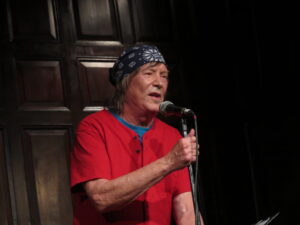
James Rado at the Love N’ Courage Benefit. Photo by Jonathan Slaff.
MZ: Terrific. And this benefit is for the Emerging Playwrights Program?
CF: This is for the benefit of emerging playwrights. First of all, we only do only new work here. We do all premieres of emerging writers and mid-career writers. We do a lot of emerging writers, and they’ve already written four or five plays before they come to us. But, when they come to us, we do have a reading series, that’s a minor part of the theatre. The main thing is that we give them a full production of sets, costumes, lights, fully professional marketing, of professional quality. They can really see their work, and we look for an audience. We sometimes get very big audiences for unknown writers, which is really not done. We do between 30 and 40 shows a year here. We made four theaters here so that we can accommodate lots of writers. At least 20 will be emerging writers.
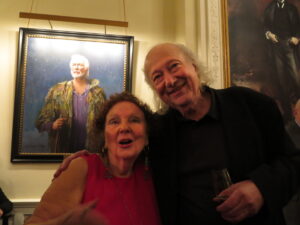
Crystal Field and Tom Attea. Photo by Jonathan Slaff.
MZ: Does their theatre seem more contained in a room to you, or does it still have more of that immersive spirit where it feel less contained in a room?
CF: It depends on the show. Like, today, I just saw a show by the new Yiddish Theatre Company at one of our theaters. And, at a certain point, they walk in the audience, you know, asking them if they want to buy bagels. It goes without saying that the fourth wall is broken in most of the plays.
MZ: To you, does it seem like they’re acting or dancing or both?
CF: Actually, it’s what they call poetic theatere. That’s what it really is. The poetic theatre will encompass encompass dance and song, and not make a big deal over it. That’s the nature of a newer kind of art.
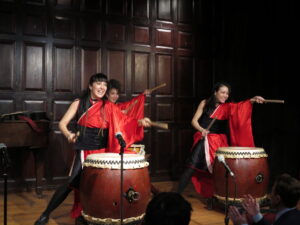
Drumming by Cobu at the Love N’ Courage Benefit 2020. Photo by Jonathan Slaff.
MZ: Do you ask them to invent their own language?
CF: Who?
MZ: The Playwrights. The Playwrights and the Choreographers.
CF: The playwright has complete control over the operation. Once we choose a play and a playwright, and we choose their play, there’s no censorship here. If we hate it, it’s too bad. We stick our noses in. We offer help where they ask for it, but they have to ask for it. If they want us to find them a director, we will. If they want us to find a choreographer, a composer, we will do it. They can bring in their brother-in-law. They can do whatever they want. If we are very upset by it, and don’t like, if there is something terrible about it, we will ask not them again. They stand or fall on their own. And that gives them tremendous freedom …
We have won 43 Obies and the Pulitzer Prize. Some of the writing becomes very successful, and some of the writers become very successful, and some of the actors become very successful … They learn all the things that a writer has to know, in order to navigate in the mainstream, and we are expecting them to move from us after a few years, if possible, into the mainstream of commercial theatre. They’re ready. They do not become a pawn or a victim.
MZ: What are some of your tactics this year to make Theater for the New City so relevant on the American Stage?
CF: We do street theatre. We do it now in five boroughs. We have a company of 50 now. We have actors and crew and two Stage Managers and three Assistant Directors, and a seven piece band. It is always about whatever the issues are.
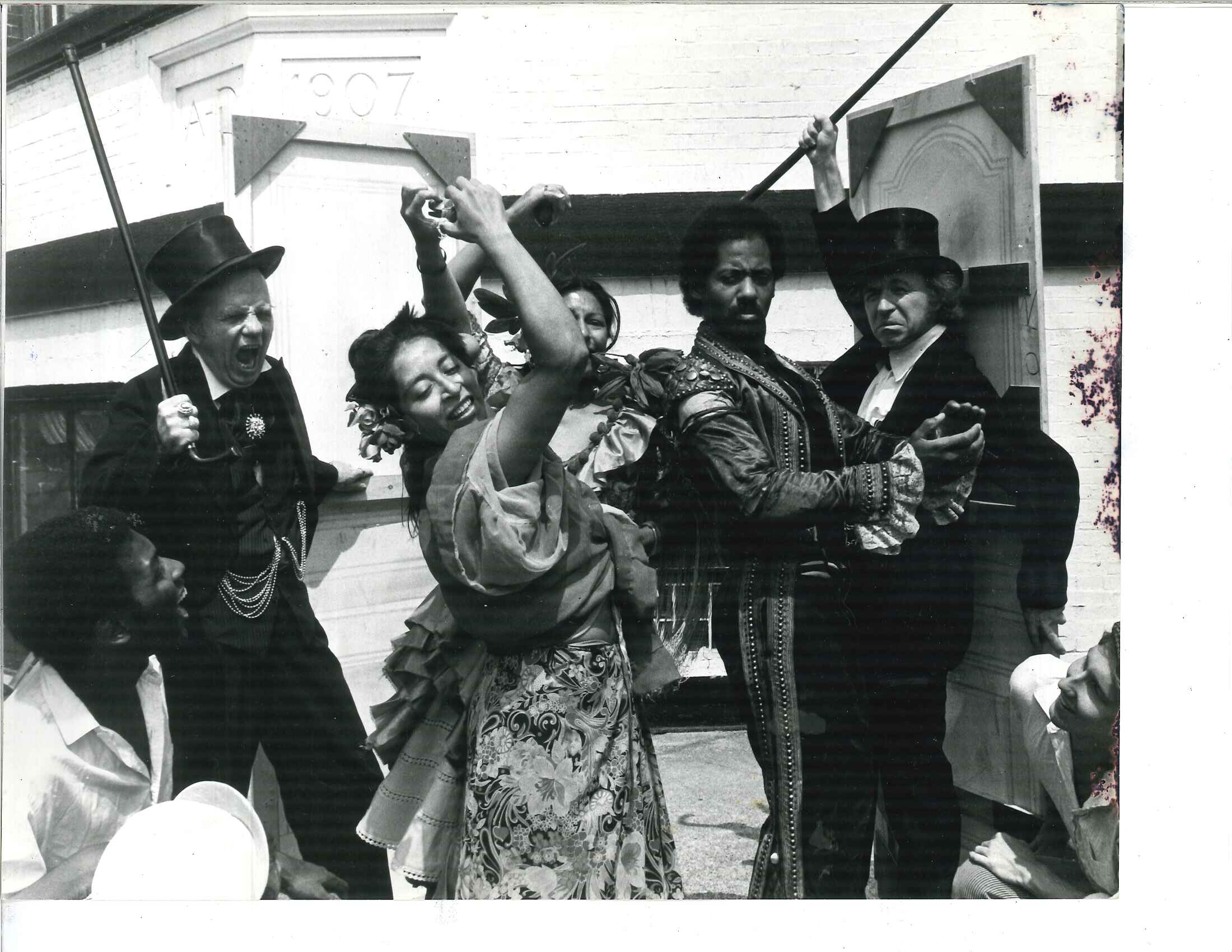
Street Theatre. Image from The Time They Turned The Water Off.
This post was written by the author in their personal capacity.The opinions expressed in this article are the author’s own and do not reflect the view of The Theatre Times, their staff or collaborators.
This post was written by Marcina Zaccaria.
The views expressed here belong to the author and do not necessarily reflect our views and opinions.

